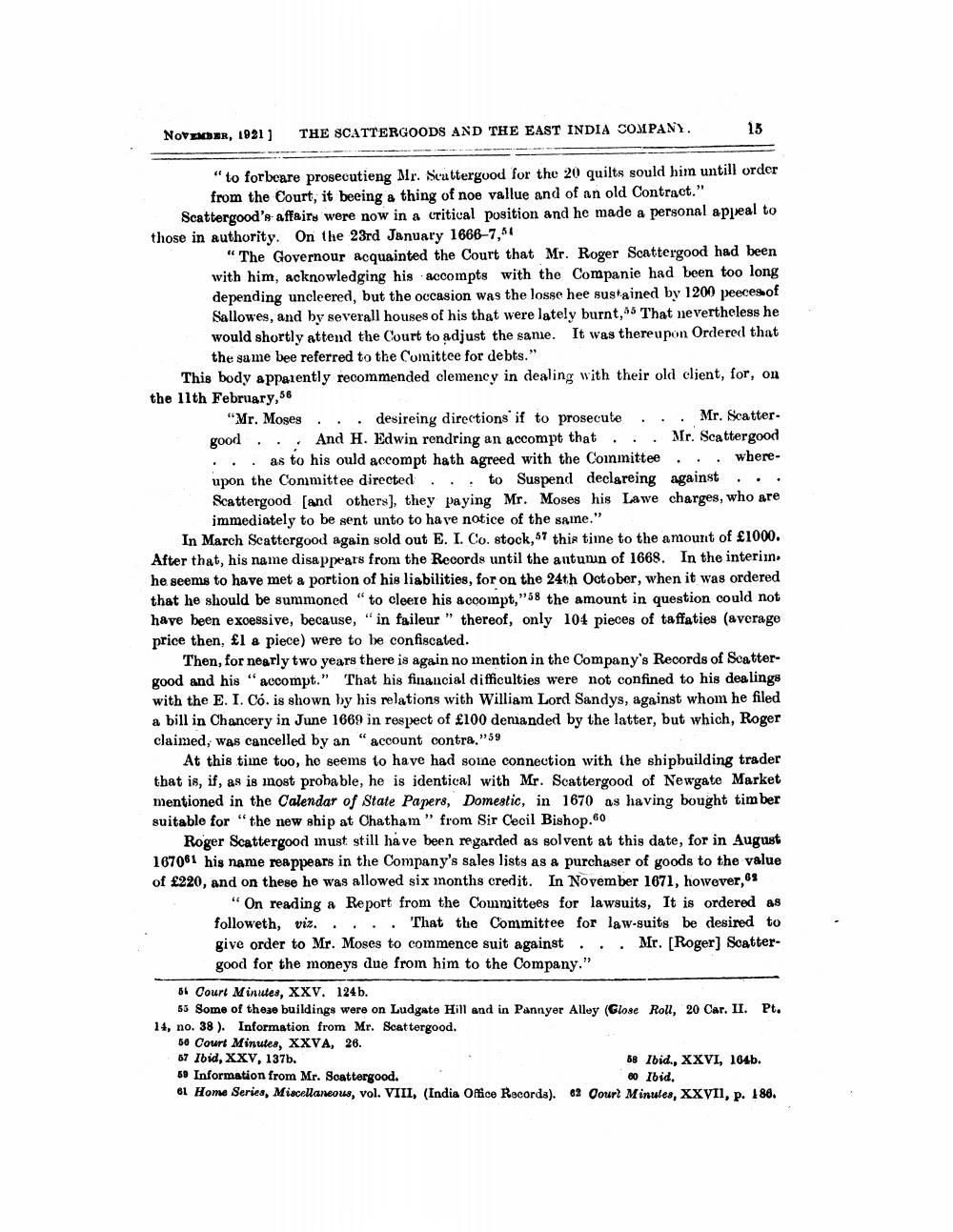________________
NOVEMBER, 1921)
THE SCATTERGOODS AND THE EAST INDIA COMPANY.
15
"to forbeare prosecutieng Mr. Scuttergood for the 20 quilts sould him untill order
from the Court, it beeing a thing of noe vallue and of an old Contract." Scattergood's affairs were now in a critical position and he made a personal appeal to those in authority. On the 23rd January 1666-7,54
« The Governour acquainted the Court that Mr. Roger Scattergood had been with him, acknowledging his accompts with the Companie had been too long depending uncleered, but the occasion was the losse hee sustained by 1200 peeces of Sallowes, and by severall houses of his that were lately burnt,55 That nevertheless he would shortly attend the Court to adjust the sanie. It was thereupon Ordered that
the same bee referred to the Comittee for debts." This body apparently recommended clemency in dealing with their old client, for, on the 11th February, 56
"Mr. Moses... desireing directions if to prosecute ..Mr. Scattergood ..And H. Edwin rendring an accompt that ... Mr. Scattergood ... as to his ould accompt hath agreed with the Coinmittee... whereupon the Committee directed ... to Suspend declareing against . .. Scattergood [and others), they paying Mr. Moses his Lawe charges, who are
immediately to be sent unto to have notice of the saine." In March Scattergood again sold out E. I. Co. stock,57 this time to the amount of £1000. After that, his name disappears from the Records until the autunun of 1668. In the interiin he seems to have met a portion of his liabilities, for on the 24th October, when it was ordered that he should be summoned "to cleere his accompt,"58 the amount in question could not have been excessive, because, "in faileur " thereof, only 104 pieces of taffaties (average price then, £l a piece) were to be confiscated.
Then, for nearly two years there is again no mention in the Company's Records of Scattergood and his "accompt." That his financial difficulties were not confined to his dealings with the E. I. Co. is shown by his relations with William Lord Sandys, against whom he filed a bill in Chancery in June 1669 in respect of £100 demanded by the latter, but which, Roger claimed, was cancelled by an "account contra,"59
At this time too, he seems to have had soine connection with the shipbuilding trader that is, if, as is most probable, he is identical with Mr. Scattergood of Newgate Market mentioned in the Calendar of State Papers, Domestic, in 1670 as having bought timber suitable for "the new ship at Chatham" from Sir Cecil Bishop.60
Roger Scattergood inust still have been regarded as solvent at this date, for in August 167061 his name reappears in the Company's sales lists as a purchaser of goods to the value of £220, and on these he was allowed six inonths credit. In November 1671, however, 69
“On reading a Report from the Committees for lawsuits, It is ordered as followeth, viz.... 'That the Committee for law-suits be desired to give order to Mr. Moses to commence suit against ... Mr. [Roger) Scatter
good for the moneys due from him to the Company." 56 Court Minutes, XXV. 124b.
65 Some of these buildings were on Ludgate Hill and in Pannyer Alloy (Glose Roll, 20 Car. II. Pt. 14, no. 38). Information from Mr. Scattergood.
66 Court Minutes, XXVA, 26. 67 Ibid, xxv, 137b.
68 Ibid., XXVI, 164b. 69 Information from Mr. Soattergood.
60 Ibid. 61 Home Series, Miscellaneous, vol. VIII, (India Ofice Records). 62 Courl Minules, XXVII, p. 188.




